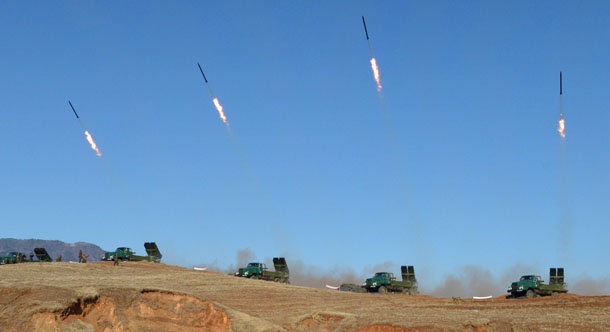RANGOON — A Burmese government spokesman said Tuesday that during meetings last week officials in Naypyidaw and their counterparts from North Korea did not discuss the controversial weapons trade between the two nations.
President’s Office spokesman Ye Htut told The Irrawaddy that discussions were instead about improving diplomatic ties between the two countries and a territorial dispute between the country officially known as the Democratic People’s Republic of Korea and South Korea.
The Burmese government’s relations with North Korea have been the subject of intense speculation since reports emerged that Burma’s former military regime had signed weapons-related deals with the country—which remains a hermitic dictatorship and was recently accused of rights abuses akin to Nazi Germany.
Since the quasi-civilian government of Burmese President Thein Sein began to reengage with Western nations, the relationship has continued to raise questions, and as recently as December 2013 the United States added a Burmese military officer and three companies to its sanctions list over arms trading with North Korea.
Burma’s state media announced that a delegation led by Kim Myong Gil, a director general in North Korea’s Foreign Ministry—the second delegation from the country this year—landed in Burma on April 3 and spent three days visiting the country. Visiting officials met with Burma’s deputy minister of foreign affairs, Thant Kyaw, and San Lwin, director general of the Foreign Affairs Ministry’s political department, official reports said.
Other than the brief reports, official sources published little information and no photographs from the visit.
In February, Kim Sok Chol, North Korea’s ambassador to Burma, met Burmese Vice President Sai Mauk Kham to discuss “mutual amity and development,” according to state-media reports at the time.
Ye Htut told The Irrawaddy that arms deals were not discussed during the visit, during which an island dispute between North Korea and South Korea was the main topic of talks.
“They did not talk about the arms trade at the meeting. We are the chairman of Asean, and we were talking about peace,” he said, adding that there was nothing unusual about the visits.
“Burma and North Korea have diplomatic relations. For this, it is very normal to visit a country,” said Ye Htut said.
“The UN Security Council did not make a decision to ban having diplomatic relations with North Korea. This is why there is no need to be concerned about their visit.”
Burma expert and author Bertil Lintner told The Irrawaddy that he doubted that Burmese officials would be involved in such discussions.
“I find it hard to believe that the visit has anything do to with the maritime boundary demarcation line between North and South Korea. Why would Burma have anything to do with that dispute?” he said.
To the dismay of Western nations, Burma and North Korea have had close relations for more than 10 years. North Korea has provided Burma with tunneling expertise, field artillery and other weapons, and North Korean technicians are helping the Burmese defense industries produce a basic Scud-type missile. In return, Burma has shipped rice to North Korea.
Pressure from the United States—which has suspended some sanctions against Burma and moved toward military cooperation—has led to more secrecy surrounding dealings between Pyongyang and Naypyidaw. Ties are still thought to remain strong, however, and an arms embargos by the United States and the European Union remain in place against Burma.
“As far as I am aware, relations between Burma and North Korea remain close and cordial, and North Koreans are still involved in Burma’s missile program,” said Lintner, whose reporting has revealed many of few details known about the relationship.
The two countries officially agreed to resume diplomatic ties in 2007, when Burma Foreign Minister Nyan Win visited North Korea in 2008. Burma had severed relations with North Korea following a 1983 bombing in Rangoon by North Korean secret agents, which killed 21 people, including four South Korean Cabinet ministers.

















